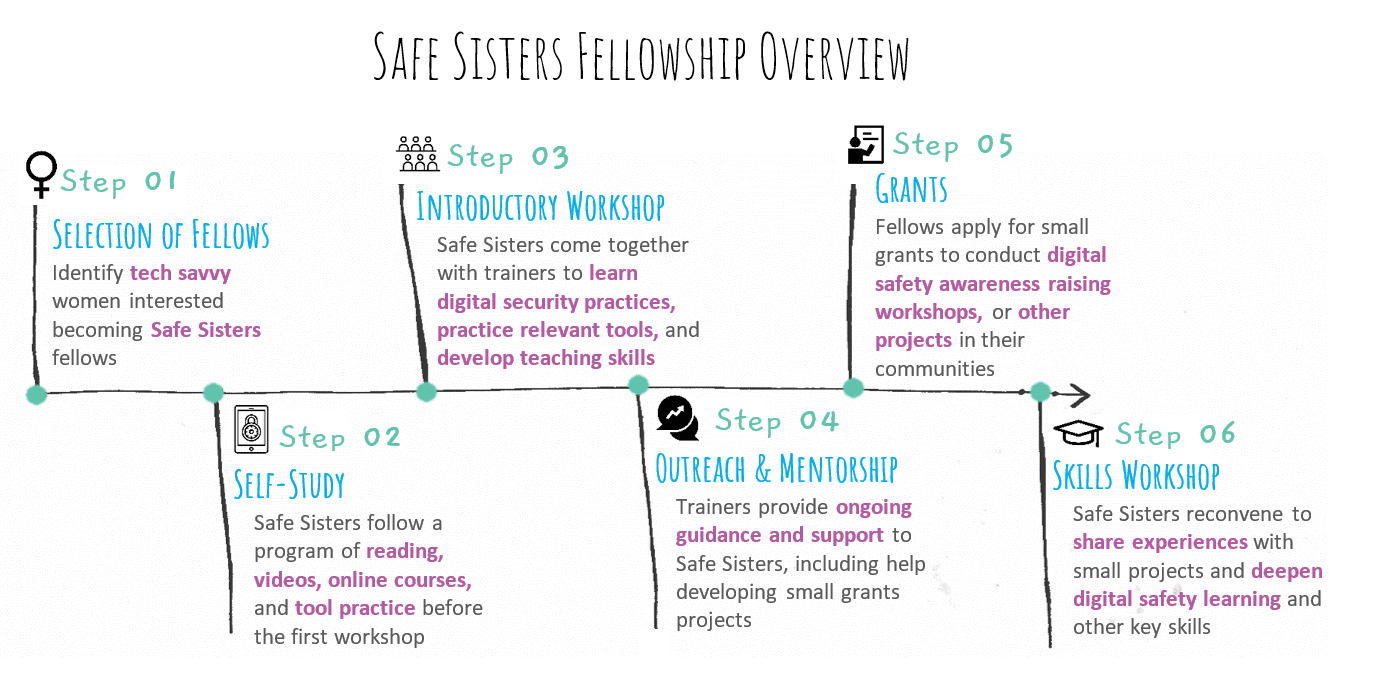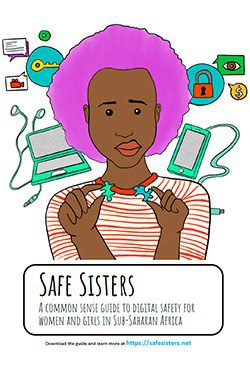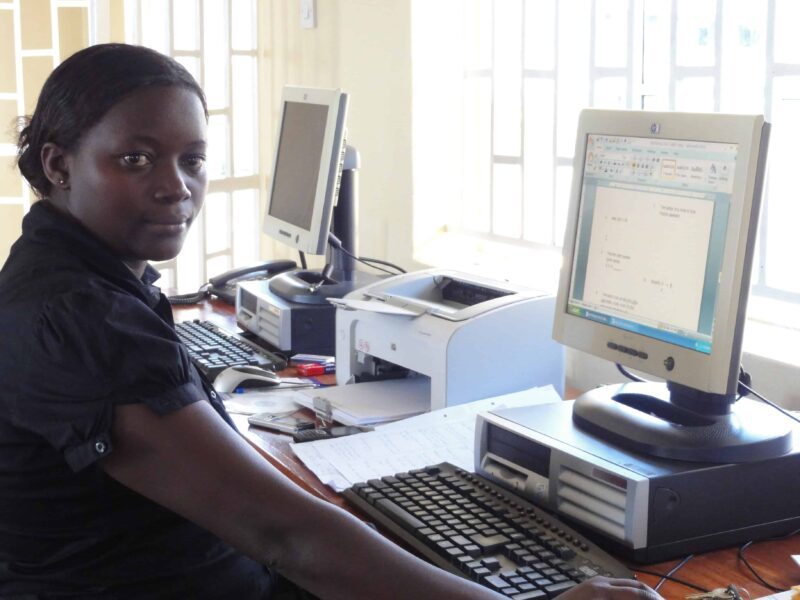Last year, a member of Uganda’s parliament won a case against online harassment. The MP, Sylvia Rwabwogo, received unsolicited, repetitive, and unwelcome messages on her personal phone. “I love you so much and want to protect you,” read one of dozens of text messages, from a man she didn’t know at all.
A court eventually agreed that the messages caused Rwabwogo to fear for her safety, and constituted harassment. But even then, in the news and on social media, many Ugandans accused Rwabwogo of being too sensitive – that she should see the attention as a compliment, that the 25-year-old man was just a “boy in love.”
If severe public backlash meets an elected official calling out harassment, imagine the difficulty facing women without any sort of public status or authority.
The unfortunately common, everyday challenges of navigating online spaces as women is the focus of Safe Sisters, an Internews and Defend Defenders digital safety and empowerment program for women and girls that has seen enormous success in increasing women’s ability to safeguard their privacy, protect their data, and, importantly, share their knowledge with women in their communities.
Challenges for women online
The digital divide remains vast. In Africa the proportion of women using the Internet is 25% lower than the proportion of men. Globally in Less Developed Countries (LDCs), only one out of seven women is using the Internet compared with one out of five men, according to the ITU.
When women do get online, they face more severe barriers that can even spill offline. They’re subject to the same types of scams and phishing that all users face, but sexual harassment, including “revenge porn,” cyberstalking, and domestic violence via technology – like being tracked or constrained online by a romantic partner – disproportionally affect women.
Making digital safety work for women
Safe Sisters, in its pilot year, worked with 13 women from five East African countries. In working with local partners to research the needs of women in this region, Internews project director Haley Slafer found that the existing tools for “digital security” weren’t connecting with many people, especially women.
“Traditional approaches to digital security training are needlessly hyper-technical. Many women we have worked with, who are tech-savvy but not tech experts, assumed for too long that this was not a space for them,” said Slafer. “We have observed this pattern play out repeatedly around the world, perpetuating a terrible cycle. A dearth of female digital security trainers and students results in the exclusion of women’s voices and perspectives from the digital safety sphere, which then reinforces the lack of resources that could lower barriers to entry for women.”
Safe Sisters rethinks digital safety training for women, basing their workshops and skills-building on real-life scenarios, put in local contexts. Eye-opening examples – like an activist discovering sensitive personal information about her had been published online without her knowledge or consent – made the realities and threats very clear.
The project selected the 13 fellows from 108 applicants, based on their roles as trusted community members and leaders, ensuring that the training would not end with the fellows, but would radiate out to their broader communities. Each fellow submitted a plan to lead local trainings or develop resources for their communities as part of the program.

The training cohort included human rights advocates and journalist and community leaders from five countries in East Africa. All participants used technology regularly in their work and everyday lives and hoped to use the Safe Sisters experience to learn how to be safer online, and to help their friends, families and colleagues.
Beyond working with trainers from the region, and adapting the training curriculum to women’s needs, Safe Sisters adapted to the realities of women’s lives – the two one-week, in-person workshops during the year provided childcare. As a result, two women with newborns were able to take part in Safe Sisters, bringing their babies along.
Outcomes
“I can now recognize online violence for what it is and I have learned to choose which battles I fight and which ones I leave. It’s been interesting to see people within my close circles come to realize just how much they have either been victims or perpetrators of violence online and so it’s is an ongoing and evolving conversation.”
–Safe Sister
It’s not an overstatement to say that Safe Sisters changed women’s lives, both personally and professionally. Six months after the program ended, all participants reported that they have changed habits online because of the training, and that they deal with online harassment differently than they did before. Seven participants reported that they have had new professional opportunities because of the training; four have started their own digital safety organizations. Seven participants reported that they have been invited to speak at international events because of their expertise on digital safety for women and girls. 100% of the Safe Sisters report being actively involved in digital safety and security.
 Collectively, the pilot project also produced the Safe Sisters Toolkit, an accessible, non-technical guide aimed at helping women and girls navigate online safety. The material is based on needs identified by the Safe Sisters in the digital safety awareness raising workshops that they held for their own communities as part of the program.
Collectively, the pilot project also produced the Safe Sisters Toolkit, an accessible, non-technical guide aimed at helping women and girls navigate online safety. The material is based on needs identified by the Safe Sisters in the digital safety awareness raising workshops that they held for their own communities as part of the program.
“My experience was life-changing to say the least. I knew I was interested in digital security training, but Safe Sisters just ignited the fire more. I learnt so much throughout the entire program, from conducting trainings to how to handle different participants… Most importantly am now a pro in encryption!” – Safe Sister
Community by community, the skills and techniques of Safe Sisters are spreading. A new cohort of women started their fellowships together in the fall.
Safe Sisters is supported by the State Department’s Bureau of Democracy, Rights and Labor (DRL). Additional support for the Safe Sisters toolkit was provided by Vodafone Americas Foundation. Defend Defenders, an East African human rights organization, partnered with Internews on the Safe Sisters pilot project. Special thanks especially to Helen Nyinakiiza, Natasha Msonza, Emma Nabwire, Neema Ayer, and Neil Blazevic.
(Banner image: Ugandan woman at computer. Credit: International Institute for Communication and Development (IICD)/CC)
